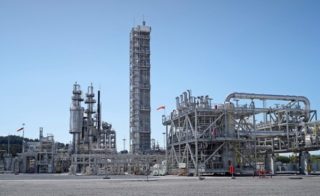-
Testing of MHI’s KS-21 solvent confirms 95-98% CO2 capture level and demonstrates 99.8% capture is achievable
Date posted:
-
-
-
Post Author
Greg Kelsall
-

Technology Centre Mongstad (Norway)
Mitsubishi Heavy Industries Engineering Ltd, a part of Mitsubishi Heavy Industries (MHI), announced recently that it has concluded testing of its new proprietary solvent for capturing carbon dioxide at the Technology Centre Mongstad (TCM) in Norway. The tests completed the commercialisation of KS-21TM, a new amine-based solvent used in the Advanced KM CDR ProcessTM developed by the company in collaboration with The Kansai Electric Power Co (KEPCO).
The testing was carried out between early May and late August 2021, where KS-21TM performance was tested to confirm a carbon capture rate of 95-98% from flue gas emitted from a gas turbine. The results are reported as indicating “outstanding energy-saving performance, reduced operating costs and low amine emissions”, exceeding both the companies’ own KS-1TM, as used in the Petra Nova carbon capture project in the USA, for example. In addition, in testing conducted under modified operating conditions, the KS-21TM solvent delivered an industry-leading carbon capture rate of 99.8% and demonstrated the successful recovery of CO2 from flue gas of lower concentration than the CO2 contained in the atmosphere. Identical tests were performed for flue gas emitted by a fluidised catalytic cracker at the Mongstad refinery located adjacent to TCM, and obtained identical results.
MHIENG acquired data from the testing of KS-21TM at TCM, such as degradation volumes during operation and handling, to improve its KS-21TM solvent further. In addition, amine emission data was obtained during the testing which will support the various regulatory approval processes and environmental assessments, and open the way to the further expansion of MHI’s carbon capture technology.
This excellent capture level of 99.8% shows that fossil fuel based power generation and ‘hard-to-abate’ industrial processes – including cement, steel, aluminium and chemicals – can operate in a net-zero emissions future using carbon capture, utilisation and storage (CCUS).
